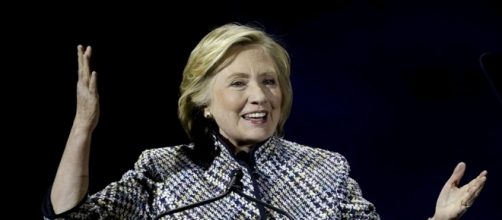Hillary Clinton came out of the woods on Thursday to speak at the Women in the World conference in New York. In her first interview since losing the 2016 presidential election to Donald Trump, Clinton attempted to rationalize her defeat by blaming everything and everyone from FBI Director James Comey to misogyny to her success as a female.
"I think it is fair to say that the outside intervention, the combination of the Comey letter on October 28th-- WikiLeaks, which played a much bigger role than I think many people understand yet-- had the determinative effect," she said to interviewer Nicholas Kristoff of the New York Times on Thursday.
Hillary can't make up her mind
Kristoff, throwing impartiality and journalistic integrity out the window, opened his interview with Hillary Clinton by saying that he wasn't sure whether he should offer Clinton his condolences or whether she should "offer them to us."
When asked by Kristoff what she thought about Comey's decision to investigate Trump's alleged ties with Russia, Clinton replied lightheartedly that it was "one of the high points" of her week. The statement drew raucous applause and laughter from the audience.
Clinton then hinted that she is currently working on a book about her failed presidential bid, although she wasn't quite finished trying to make up her mind about who to blame for her stunning upset loss.
After pinning the blame on WikiLeaks and James Comey, she then told Kristoff that misogynists were also at fault.
"Certainly misogyny played a role. That just had to be admitted," she added.
She might have lost because she's just too successful
Later, while discussing her unfavorable ratings in public opinion polls, Clinton suggested that the reason why she was so intensely disliked was that she's just too successful, explaining that there's an "inverse relationship" with success and likability when it comes to women.
"The more successful men are, the more well-liked they are," said Clinton, "while women are disliked for their success."
Although she took blind swings at the several parties she felt were responsible for costing her the White House, she forgot to blame white supremacists, unlike her campaign aides did earlier this year.
In January, a post-election discussion at Harvard's Kennedy School of Government turned into a shouting match between Trump and Clinton campaign aides after Hillary Clinton's communication staffer, Jennifer Palmieri, stated, "If providing a platform for white supremacists makes me a brilliant tactician, I am proud to have lost.”

